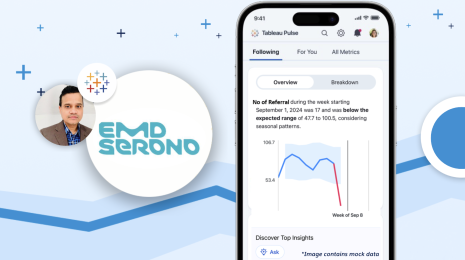Data Diaries: A hiring guide for building a data-driven culture

Note: Data Diaries is an occasional series that explores the makings of a culture of analytics. This post first appeared in VentureBeat.
We live in a world awash with data. From sensor data to website data, to fitness data, nearly every aspect of our lives is quantified. And digging into the numbers helps us better understand ourselves, our neighbors, and our world.
For organizations, this can yield a huge competitive advantage—if they can see and understand their data. And that’s why many are adopting a culture of self-service analytics.
In this culture, data plays a central role in every major conversation. Everyone has the ability to ask and answer questions of their data. The entire organization subscribes to a data-backed truth, and facts drive decisions.
But building this culture involves fostering a data-driven way of thinking within the organization. It also involves hiring the right people to grow the culture.
Seek out critical thinkers
So who, exactly, are the right people? You might think they’re the candidates with the most knowledge of the latest technology. While technical skills are important for some roles, there is one non-negotiable trait that every team member must have. It’s one I look for in every one of my hires.
In short, I look for people who can think critically with data. Do they know how to ask questions of their data, and analyze the answers? Can they make a point, and use data to support it?
Don’t rely on gut feel
To look for critical thinking, I give all the candidates a test. In other words, I turn to data over instinct. That may sound intuitive, but most people who think they’re good at hiring say they go on gut feel according to the book Sway: the Irresistible Pull of Irrational Behavior by Ori and Rom Brafman. And after the fact, these same people believe they made the right choice just 30 percent of the time. That means their instincts proved wrong 70 percent of the time. That’s why an on-the-job test is best, say the authors.
When I’m looking to hire a data analyst, I provide my candidates with data, the analytics tool of their choice, and three general questions of the data. And the results prove quite revealing.
Their answers tell me whether the candidate can form questions to ask of their data, and whether they have proficiency in answering them. But the most important score is whether they asked follow-up questions of the data.
Look for innate curiosity
I intentionally leave my questions open-ended for this purpose, because I want to find people with a natural analytic curiosity. I want to see that the candidate answered my three questions, which led to six more questions, which led to three more before time ran out. I want to see that the candidate went beyond my initial questions, because answering them is arguably not the point.
This exercise lets me go beyond judging whether the person seems nice and professional. Those things matter, but they’re not enough. Innately curious people who can think critically are the building blocks to a culture of analytics. And this applies to non-analysts as well. Business users many not be as versed in data analysis, but you can still test for the same instincts with an exercise tailored to their role. In this culture, they, too, need to make data-driven decisions.
Courage to challenge?
I also like to ask candidates about a time when their boss took a position that wasn’t supported by data. I want to hear that they felt a responsibility to speak up. I want to hear that they went beyond saying that the data doesn’t support the boss’s position to outlining what the data does support. And if they boss remained unconvinced, I want to hear that they were able to resolve that disparity within themselves.
I look for people who will challenge me. After all, I try to hire extremely smart people, and I want to give them every opportunity to exercise their intellect. But I also want to know that they can trust my leadership when they disagree with me, which is bound to happen from time to time.
'Hire for the things you don't want to—or can't—teach'
When I was starting out, I interned under the city manager of Edina, Minnesota—essentially the city’s CEO. I got to sit in on a number of interviews, and I realized I didn’t understand how the city manager chose which candidate to hire. When I asked him, he gave me one of the best advice I’ve ever gotten. He said: Hire for the things you don’t want to—or can’t—teach. Everything else is negotiable.
In the context of an analytical culture, making data-supported arguments isn’t something I want to teach. And a natural, analytical curiosity isn’t something I can teach. Of course, every job requires other skills as well. But if someone is smart, curious, and wants to take things apart to see how they work, I’ll choose that person over a comparable candidate every time.
Learn more about building a culture of self-service analytics
Data Diaries: How VMware Built a Community around Analytics
Data Diaries: Defining a Culture of Self-Service Analytics
Building a Culture of Self-Service Analytics? Start with Data Sources
In a Culture of Self-Service Analytics, Enablement Is Crucial
Boost Your Culture of Self-Service Analytics with One-on-One Support








